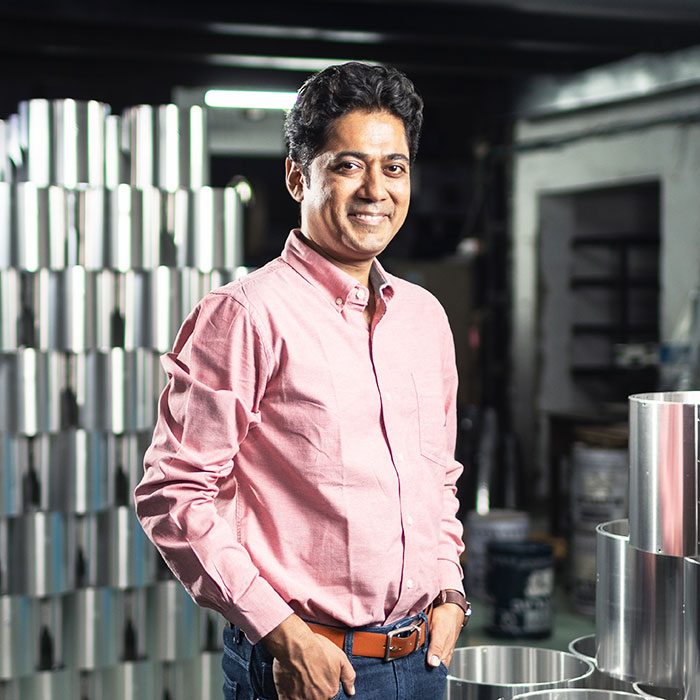

Ankit Mathur, Co-founder, Greenway Grameen
Ankit Mathur: Greenway is an organization focused on designing, manufacturing and distribution of products for rural markets. We identify problems unique to households in rural areas, innovate through novel product design and distribute products through our extensive network of field officers who reach deep rural areas. Over the years, we have worked across energy access, entertainment, water purification and efficient electric appliances.
Ankit Mathur: Lack of access to cleaner cooking is a problem that affects over 3 billion people across the world. Even in India, despite of continuous efforts of the government, a large number of rural households continue to cook using unprocessed biomass. Particulate Matter emission due to mud cookstoves are a major cause of respiratory and other diseases, even leading to death across hundreds of thousands of women and children. At Greenway, we identified this as a problem that could be solved through product design innovation early on in our organizational journey. We used the principles of user-centric design to come up with Greenway Smart Stove in 2011 and Greenway Jumbo Stove in 2015.
Ankit Mathur: Energy efficient cookstoves are an important tool in addressing climate change. However, it would be myopic to see cookstoves only as a means to earn carbon credits. Distribution of cookstoves can be sustainable only through a well-thought-out long-term strategy that puts users and communities at the centre. We have distributed over 3 Million Greenway stoves in our 13 year journey and it is only in the past 3 years or so that carbon credits started playing an important part in the distribution model.
Ankit Mathur: Cooking using biomass contributes to roughly 2% of the global carbon emissions. The aggregate emissions due to inefficient traditional stoves are almost as high or greater than emissions from global aviation. Further, cookstove projects are instrumental in addressing a number of Sustainable Development Goals while tackling energy access. This makes these a critical part of the answer to reducing emissions.
Ankit Mathur: The process of tracking and verifying the use of efficient cookstoves is project specific. This process also depends on the IT tools available to various project developers undertaking a project within an approved methodology of a carbon standard. At Greenway, we have invested heavily into IT tools that allow us to map each cookstove with a unique identifier to a rural household. We extensively work with a variety of project developers with whom we share our technology stack and distribution expertise. However, while the technology stack allows for tracking across a variety of projects, the choice of distribution model depends on the carbon project developer or offtaker for an individual project.
Ankit Mathur: In the next two years, we are actively looking to expand our portfolio into household appliances beyond clean cooking. We have invested heavily in R&D and have an exciting product line that we are looking to launch in the coming months. At the same time, we are upskilling our sales team and IT systems to be able to service customers with a wider product portfolio.
Ankit Mathur: We raised a round of equity capital in 2015. That round helped us strengthen our supply chain and distribution network. Recently, we raised a round of debt from Asian Development Bank towards working capital financing for distribution of Greenway Jumbo Stoves. Our current focus remains on expanding the product portfolio and we won’t be seeking fresh funding anytime soon.
Ankit Mathur: Using technology to engage with communities is a low-lying fruit. While this may sound broad, there are many applications across access to finance, engaging with farmers and healthcare that I can think of. Another low-lying fruit in my opinion is an opportunity to innovate across a number of electrical and electronic devices that provide a better quality of life to people. In my opinion, as the access and quality of electricity increases, efficient home appliances will present many attractive demand side intervention projects.
Ankit Mathur: Well regulated carbon markets allow for innovative projects with clear climate impact to scale actively. Policies that may establish compliance carbon market in India shall catalyze investments into climate action projects and would also accelerate the achievement of our Nationally Determined Contributions as per Paris Agreement.
Ankit Mathur: I believe that we have a lot of ground to cover for both energy security and food security. Coupled with focus on climate change and adaptation, this area will be present very interesting opportunities. Further, there are a lot to exciting initiatives to come across supply side as well as demand side interventions in India’s transition journey. These will be further accelerated with innovations in materials science and integration of low carbon materials in supply chains.
1. The mandate for blending Compressed Biogas (CBG) with natural gas has come into effect…
Andhra Pradesh is striving towards greening its energy sector with quite some speed. In a…
With an objective to bolster India’s green energy goals, a Tripartite Agreement has been signed…
The Union MNRE Minister Pralhad Joshi launched the Green Hydrogen Certification Scheme of India (GHCI)…
India’s energy conglomerate Bharat Petroleum Corporation Limited (BPCL) has commissioned a 5MW green hydrogen plant…
In a historical development, the European Space Agency (ESA) has successfully launched its pioneering ‘Biomass’…